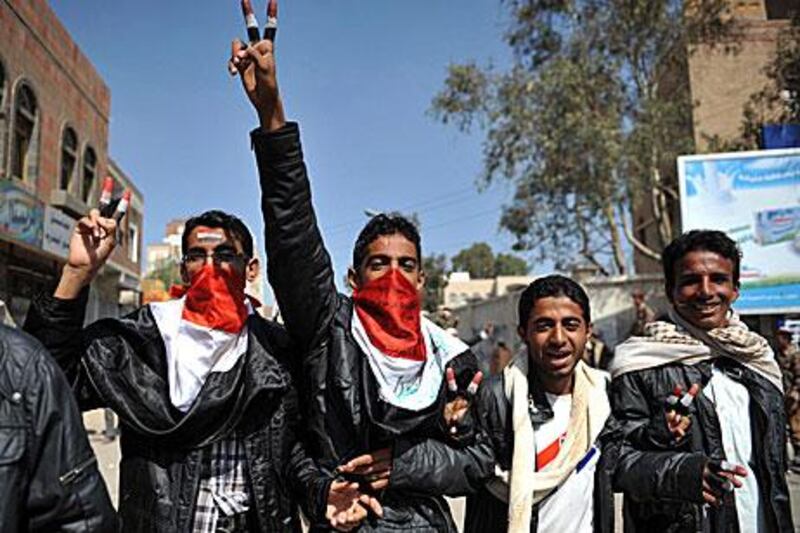RIYADH // Yemen's president, Ali Abdullah Saleh, yesterday signed a Gulf-brokered peace deal to surrender power in return for immunity from prosecution in a bid to end a bloody anti-government uprising that has pushed the country close to civil war.
After pulling out of the deal three times in recent months, Mr Saleh signed the accord giving power to his deputy in the presence of Saudi King Abdullah bin Abdulaziz Al Saud and Crown Prince Nayef bin Abdulaziz Al Saud.
But tens of thousands protested in Yemen’s capital, Sanaa, and across the country yesterday condemning the immunity clause that prevents Mr Saleh facing charges over his crackdown on dissent that has killed more than 1,000 people since January.
“Saleh must be prosecuted,” shouted protesters in the southern city of Taiz, which has been at the forefront of the uprising and the scene of much violence. Some carried photos of those killed by government forces.
“We consider the deal treason to the blood of the democracy protesters,” said Taiz Bushra Al Maktari before the Riyadh ceremony. “Our revolution was not meant to topple only Saleh but all political, military as well as tribal repression.”
Government troops skirmished with gunmen loyal to a powerful opposition tribal leader in Sanaa and some clashes were reported in Taiz. Hours before the Riyadh signing, explosions and gunfire echoed through parts of Sanaa.
Bitterness and anger mixed with relief among the protesters in the capital, some of whom have been camped out at a makeshift tent city for months.
“He ... forgets the killing of hundreds of peaceful protesters,” said activist Mohammed Al Sharabi.
“The speech of Saleh does not show a promising result,” he said, adding Mr Saleh should have admitted his mistakes and apologised to his people, Pharmacist Faisal Al Surori said Yemenis had paid in blood for the peace deal.
“The opposition and the government [have] made a deal at the expense of the blood of the people,” he said.
But for others, there was optimism.
“I am happy and relieved, I hope this will put an end to our suffering and pains. We have lost a lot during the unrest. I lost my job,” said Mohammed Al Mohamadi.
Dressed smartly in a dark business suit with a matching striped tie and handkerchief, Mr Saleh smiled as he signed the deal in Riyadh and then clapped his hands a few times. He then spoke for a few minutes to members of the Saudi royal families and international diplomats, promising to cooperate with the new Yemeni government.
“This disagreement for the last 10 months has had a big effect on Yemen in the realms of culture, development, politics, which led to a threat to national unity and destroyed what has been built in past years,” Mr Saleh said.
He is the fourth Arab leader toppled this year by the wave of Arab Spring uprisings, stepping down after longtime authoritarian leaders fell in Tunisia, Egypt and Libya.
Syria’s president, Bashar Al Assad, is fighting an uprising against his rule and facing mounting calls by his neighbours and the international community to go. Mr Saleh addressed his country’s troubles without mentioning the demands of protesters. Instead, he called the protests a “coup” and the bombing of his palace mosque that seriously wounded him in June “a scandal”.
This was the fourth attempt to wrap up the Gulf Cooperation Council power transfer deal. Mr Saleh backed out at the last minute on three previous occasions, fuelling turmoil that has bolstered Al Qaeda militants in Yemen, which is next door to Saudi Arabia, the world’s largest oil producer.
Ban Ki-moon, the United Nations secretary general, said Mr Saleh had told him during a phone conversation on Tuesday he would fly straight to New York for medical treatment after signing the agreement.
Opponents of Mr Saleh have been protesting and fighting since January to end his 33-year rule over one of the Arab world’s poorest countries.
Under the peace plan, Mr Saleh will shift all his powers to his deputy, Abdurabu Mansur Hadi, a career military man until he entered politics, within 30 days. Mr Hadi will form a new government with the opposition and hold an early presidential election within three months.
Months of protests have rekindled conflicts with Yemen’s Islamist militants and separatists, threatening anarchy in a country Washington regards as a front line against Al Qaeda.The unrest has also raised fear of civil war on the borders of Saudi Arabia, a crucial strategic ally of the United States. The fears are shared by Mr Saleh’s former US allies, who had long backed him in their fight against Al Qaeda.
The country is gripped by lawlessness and conflict. Yesterday, the International Committee of the Red Cross said three of its staff, including a foreigner, had been kidnapped in Yemen’s restive south.
The three – an ICRC delegate, her Yemeni driver, and a staff member of the Yemeni Red Crescent – were delivering food to refugees in the province of Lahj, north of the port city of Aden.
* With reporting by the Associated Press, Agnece France-Presse and Reuters





